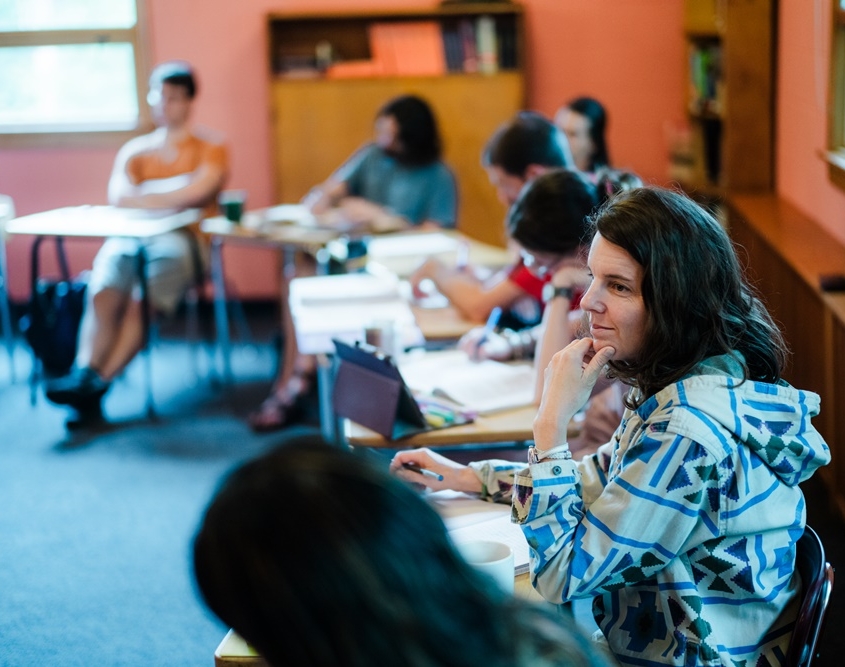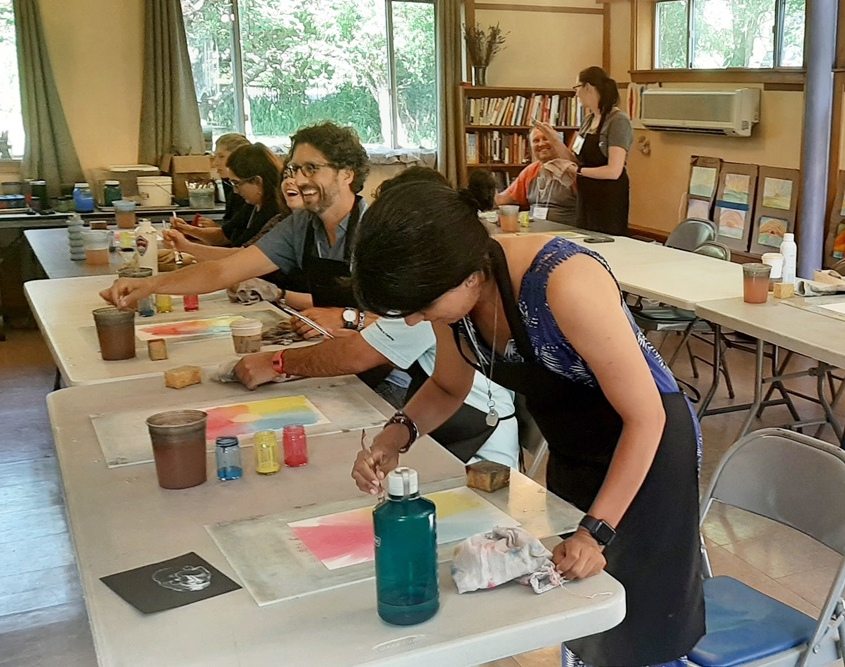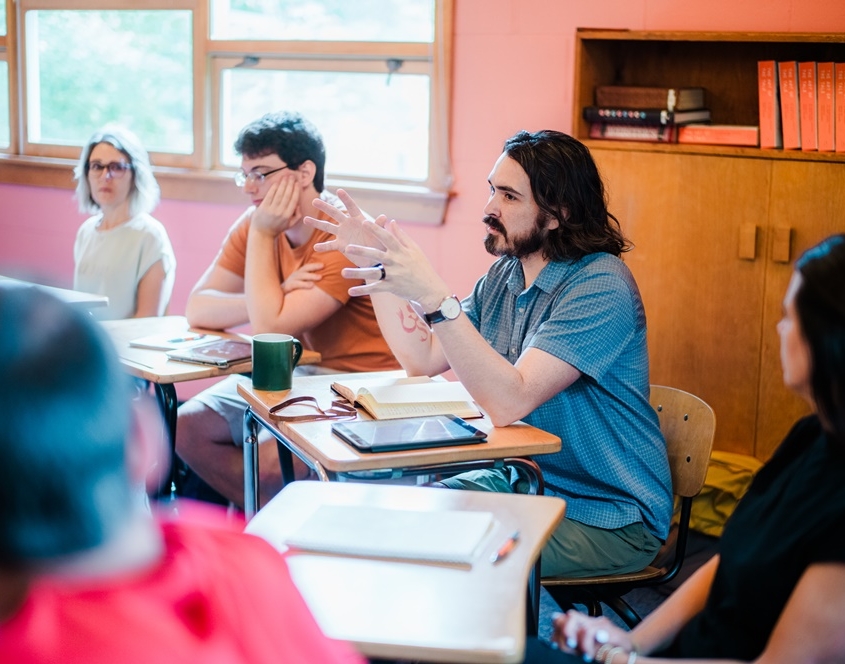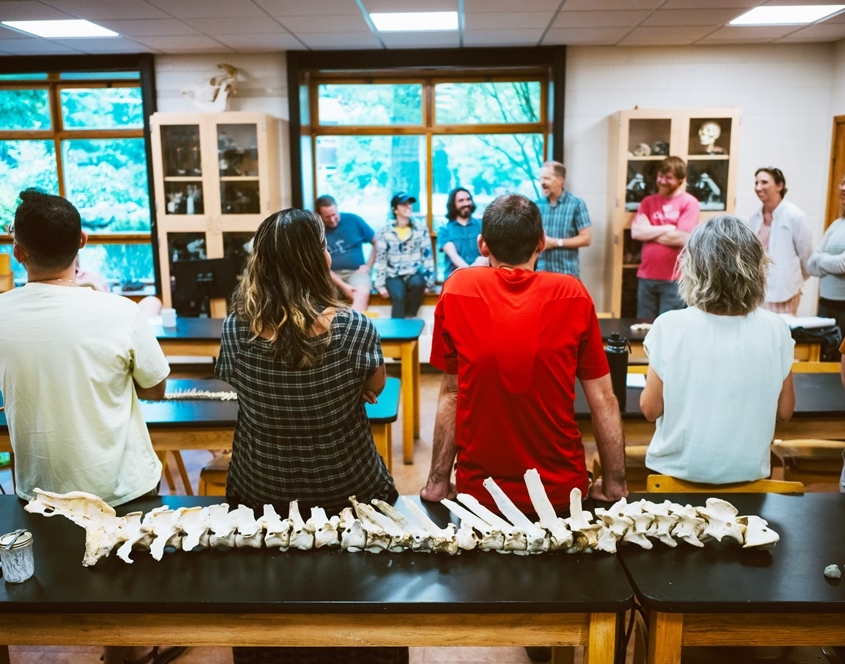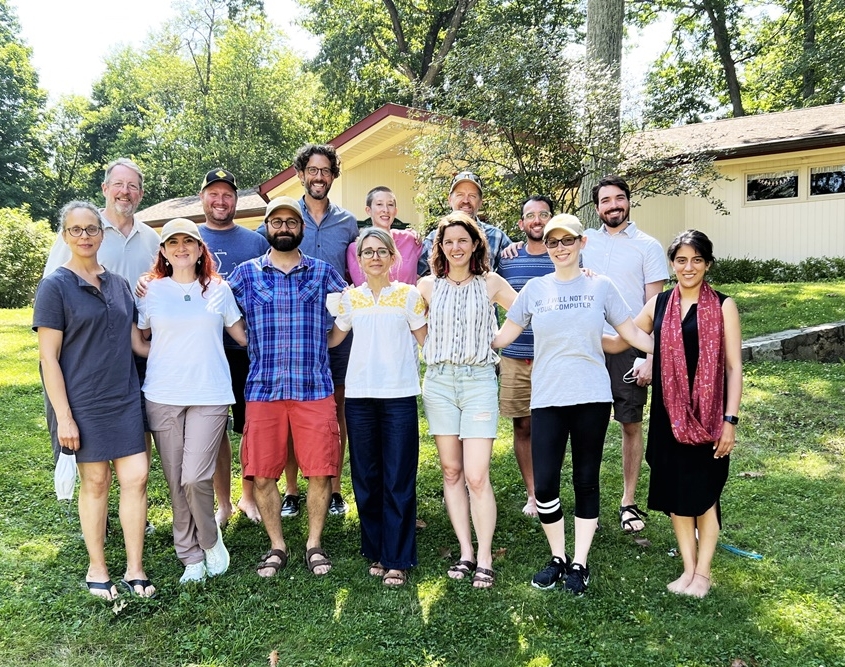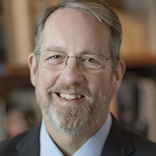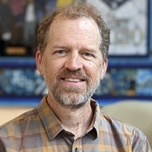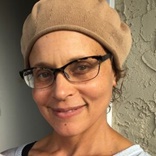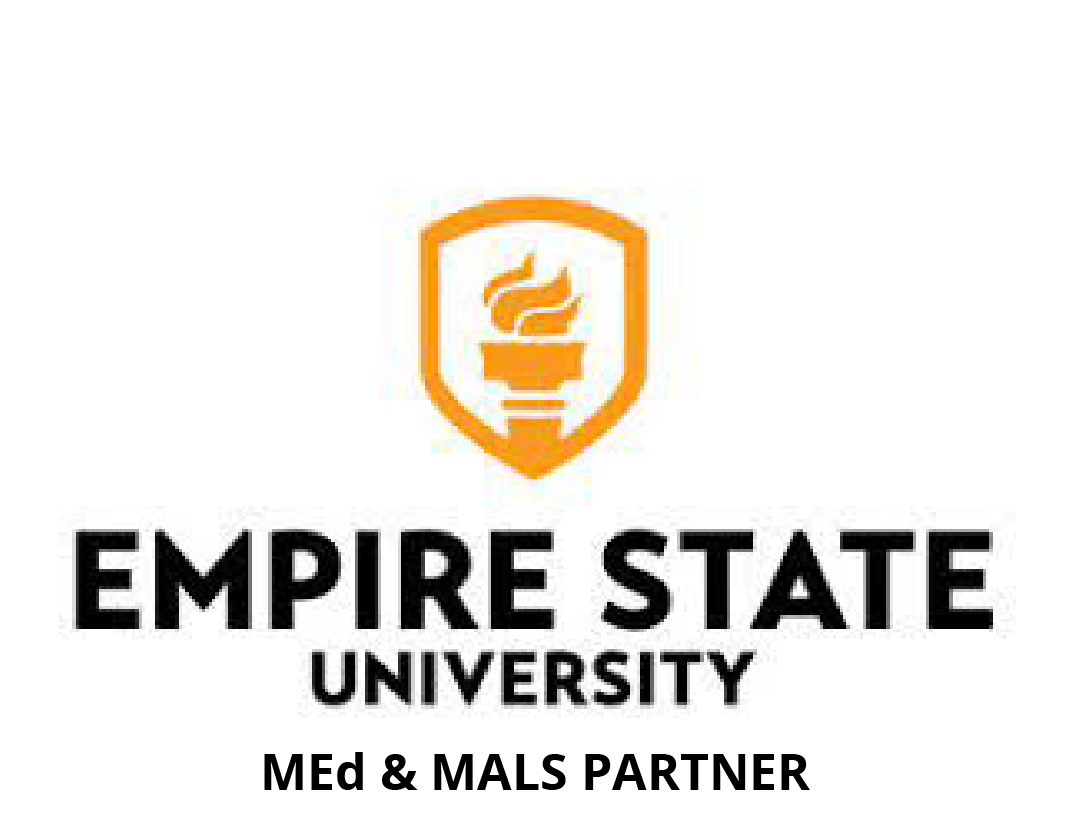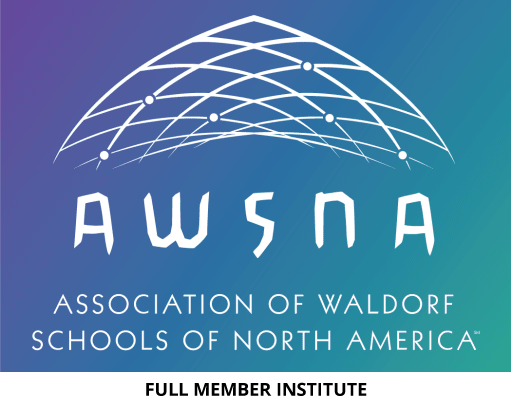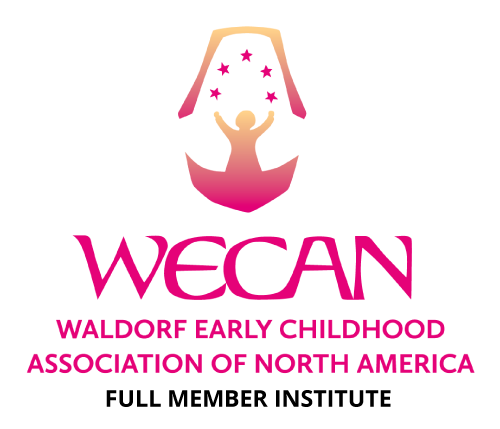Sunbridge Institute’s Waldorf High School Teacher Education program provides appropriate credentials and practical, philosophical, and artistic foundations for successful Waldorf teaching in a wide variety of subjects in grades 9 through 12. This is a hybrid low-residency program, with summer sessions held on campus and weekend classes taking place online during the school year. Graduates are conferred a diploma in Waldorf High School Teacher Education.
Director: Stephen Sagarin, PhD
This program enrolls every summer. Now accepting applications for the cohort entering July 2026 (on-campus session: July 12-24). See below for admissions information.
To learn more, come to our October 29 High School Teacher Education online Meet & Greet.
Program
The goal of Sunbridge’s Waldorf High School Teacher Education (“WHSTE”) program is to guide teachers in their development as educators and as persons. We aim to develop points of view, based deeply in Rudolf Steiner’s educational work, that give you the means to teach your subject or subjects to adolescents in today’s world. Negotiating the tension between Steiner’s work in Germany in the early 20th century and the requirements and considerations of adolescent education in North America in the 21st century is at the heart of our work.
Through lecture, discussion, reading, writing, and observation, in courses and classes both broad and subject-specific, you’ll come to know why and how Waldorf teachers do what they do, and you will develop your own view of principles, methods and curricula. You will also work to develop a contemplative practice that will support your teaching and assist you along the path of a teacher. In addition, through independent projects and mentored teaching, you will engage with lesson, course, and curriculum creation and planning.
Program Goals
It is expected that this program will prepare you to:
- Design lessons and courses that address appropriate development of your students’ thinking, feeling, and willing (cognition, affect, and behavior).
- Understand, interpret, and apply the philosophy and contemplative practices of Rudolf Steiner to your own preparation and practice.
- Teach creatively, regardless of subject matter, to enliven and support student learning and human development in developmentally appropriate ways.
- Demonstrate the skills necessary to create healthy learning communities within a classroom, school, and learning environment, including work with colleagues and parents
- Regard teaching as ongoing research, and to further develop practices using appropriate methods, including observation, contemplative practice, and academic research skills.
Program Components
Length
Sunbridge’s High School Teacher Education program combines in-person coursework with synchronous online instruction. The program is divided into two-week terms of on-campus study for each of three summers, supported by five online weekend (Friday evening-Saturday) sessions that take place during each of the two interim academic years, for a total of six weeks of in-person classes and ten online weekend sessions.
Curriculum
The WHSTE program consists of courses in the following areas:
- Educational principles, methods, and curricula
- Adolescent development
- Anthroposophy, including inner development
- Practical work in a high school
- Artistic development
Fieldwork
In addition to in-person and online coursework, and in accordance with minimum expectations set by AWSNA, the program carries requirements for students to engage in practical experiences (“fieldwork”) in Waldorf classrooms during the course of your studies. The specific requirements for fieldwork will vary according to your work status as a Waldorf teacher. The program director/advisor will guide each student through their fieldwork for an optimum experience.
Fieldwork refers to:
- Observation: Observing a class other than the student’s own. All students are required to keep a journal of their observations and submit the journal to their advisor for review.
- Student teaching: Creating and delivering curriculum content under the guidance of an accomplished teacher in an AWSNA-affiliated school
- Mentored teaching: A student visited in their own teaching classroom by a highly experienced Waldorf high school teacher for observation, conversation, and feedback to support and guide the student in practical aspects of their work and in their development as an educator. The mentor’s observation records are shared with the student and with the WHSTE program director.
For the purpose of determining fieldwork requirements, WHSTE students are divided into two categories:
- In-service: Those students who are actively working as high school teachers in an AWSNA-affiliated school
- Pre-service: Those students who do not fall into the definition of in-service
NOTE: If a student’s work category changes during the course of the program, their fieldwork category (and requirements) will change accordingly.
Fieldwork Requirements for In-Service Students:
- Observation: (18 hours minimum)
-
- Three observations of 3-5 consecutive days each, at least two class hours per day.
- Two of these three observations should be in one’s own school and one at another school, ideally a non-Waldorf school. Based on our experience, it is beneficial to observe in non-Waldorf schools to better understand what aspects of our work are common to all teachers who work with high school students and what aspects are relatively unique to Waldorf school.
- Two of these three observations should be within a student’s own discipline; one should be in a different discipline. Similarly, understanding teaching in our own disciplines and subjects benefits from seeing how teachers of other subjects and disciplines parallel or diverge from ours.
- Three observations of 3-5 consecutive days each, at least two class hours per day.
- Mentored teaching: (40 hours)
- Students receive one week of mentoring in the fall and one week in the spring for two years. Mentoring is conducted by a school-assigned mentor or coach.
Fieldwork Requirements for Pre-Service Students:
- Observation: (18 hours minimum)
- Three observations of 3-5 consecutive days each, at least two class hours per day.
- Two of these three observations should be in one’s own school and one at another school, ideally a non-Waldorf school. Based on our experience, it is beneficial to observe in non-Waldorf schools to better understand what aspects of our work are common to all teachers who work with high school students and what aspects are relatively unique to Waldorf school.
- Two of these three observations should be within a student’s own discipline; one should be in a different discipline. Similarly, understanding teaching in our own disciplines and subjects benefits from seeing how teachers of other subjects and disciplines parallel or diverge from ours.
- Three observations of 3-5 consecutive days each, at least two class hours per day.
- Apprenticeship, including student teaching: (30 hours minimum)
- One seminar (main lesson, morning lesson) block of 3-5 weeks or equivalent number of hours (approximately 30-50), depending on subject area and schedule. School approved by director/core faculty.
Sunbridge aims to be flexible with and supportive of each student as they fulfill their fieldwork requirements. Students have a one-year, post-graduation grace period for fieldwork completion. Students requiring this grace period will be issued a completion of coursework certificate at commencement, with their final diploma issued upon completion of their fieldwork requirements.
Advising
WHSTE faculty are available in-person and remotely throughout the course of the program for advising sessions (each student receives 5 hours minimum). In addition, core faculty meets with sections or disciplines—math, science, languages, history and literature, and others as necessary—during lunch to discuss relevant topics.
Student Benefits: Further Educational Opportunities
At Sunbridge, we recognize that teacher preparation takes many forms. That’s why, in addition to our coursework, fieldwork experiences, and advising support, we offer our students and graduates additional opportunities to further develop and hone their teaching expertise and acquire new insights and skills. These opportunities include:
- Highly-reduced discounts to our professional development courses and workshops while you are a student in our program and in the year immediately following graduation, plus lesser discounts in the years beyond that
- Being welcomed back to audit WHSTE classes free of charge once you are a program graduate (in good standing)
- Being awarded 12 credits for your Sunbridge diploma toward earning a fully-accredited 30-credit master of education degree or 30- or 36-credit master of arts in liberal studies degree with self-designed concentration in Waldorf education through the Sunbridge/SUNY Empire State University partnership
Core Faculty
Stephen Sagarin
Program founder and director, Steve is also co-founder and faculty chair at the Berkshire Waldorf High School, where he teaches history and art. Since 2000, Steve has also been a core faculty member of Sunbridge’s Elementary Teacher Education program and, from 2019-2023, was a member of the Sunbridge Board; previously, he served as associate professor and director of Sunbridge College’s MSEd program. He is also a former teacher and administrator at the Great Barrington Rudolf Steiner School and The Waldorf School of Garden City, the high school from which he graduated. Steve has taught history of education at Teachers College, Columbia University; human development at the City University of New York; and US and world history at Berkshire Community College. Former editor of the Research Bulletin of the Research Institute for Waldorf Education, he writes, lectures, mentors teachers, and consults with Waldorf schools on teaching and administration nationwide and in various parts of the world. He is the author of The Story of Waldorf Education in the United States: Past, Present, and Future; How the Future Can Save Us: Rudolf Steiner’s Educational Work; and of the introductions to Rudolf Steiner’s Art History and What is Waldorf Education? Three Lectures. His blog “What is Education?” may be found at ssagarin.blogspot.com. Steve holds a BA in art history and fine art from Princeton University and a PhD in history from Columbia University.
Gary Banks
Gary is a high school math and science teacher at Rudolf Steiner School of Ann Arbor, where he has been on the faculty since 2007; he also chairs his school’s College of Teachers and is a Board trustee. Gary is also a presenter in the Teaching Sensible Science course and has taught in a number of teacher training programs and foundation studies courses. From 1993-2001, he took a class from first to eighth grade at the Denver Waldorf School, then worked as a high school science teacher at High Mowing School and a class teacher at Pine Hill Waldorf School before moving to Michigan. Gary earned his bachelor’s and master’s degrees in aerospace engineering from the University of Colorado and worked as a research engineer on the NASA Space Station project before entering teaching. He completed his MEd at Antioch New England Graduate School and is an enthusiastic hiker, gardener, and musician.
Heather Scott
Heather most recently served as the pedagogical director of the Waldorf School of Lexington. Previously she worked at The Waldorf School of San Diego for 17 years, where she taught high school humanities and graduated two eighth grade classes. She also spent time teaching at The Community School for Creative Education, a public, Waldorf-inspired charter in Oakland, CA. Heather’s interests are in diversifying Waldorf middle- and high-school curricula. A member of Alma Partners, she is passionate about supporting anti-racism through a grounding in history and biography and has a decades’ long interest in African-American culture and literature, especially attuned to Black women writers. Heather earned her Waldorf teaching certificate from Antioch New England, her BA from Sarah Lawrence College, and her MA from The University of New Hampshire, Durham.
Noelle Frerichs
Noelle joined Rudolf Steiner School of Ann Arbor as a high school mathematics teacher in 2017 and now enjoys teaching both mathematics and physics; she also sits on their College of Teachers. Prior to joining RSSAA, she spent time as a class teacher at the Oakland Steiner School in Rochester Hills, Michigan, as well as many years as an automotive engineer at both Chrysler and Mercedes-Benz where she focused on chassis design and development and emissions certification. Noelle received a Bachelor of Science with honors in Mechanical Engineering from Michigan State University and a Master of Science degree in Systems Engineering from Oakland University. She completed her Waldorf grades training through the Waldorf Institute of Southeast Michigan and earned her Waldorf high school teacher education certification through CFA. Noelle is passionate about Waldorf education and enjoys collaborating with colleagues and continuously learning new things. When she’s not teaching, she enjoys hiking, climbing, wheel-throwing pottery, spending time outdoors with her family and pets, and travelling.
High School faculty also include Roland Rothenbucher, MA, high school chair and German teacher, The Waldorf School of Garden City; Beth Robbins, English and drama teacher, Berkshire Waldorf High School; and Hans Staats ’24, PhD, high school humanities teacher, Austin Waldorf School. Additional faculty include members of the Sunbridge Elementary Program faculty.
Entrance Requirements
Sunbridge’s Waldorf High School Teacher Education program welcomes applicants who hold a bachelor’s degree from an accredited college or university (or the equivalent for international study). Candidates who hold a master’s degree are preferred; current Waldorf school employment is a plus.
Foundation Studies coursework is embedded in the program curriculum and therefore is not a separate prerequisite; however, you are expected to have some familiarity with Waldorf education.
Application Process
The regular application deadline is June 1. Applicants are encouraged to apply as early as possible, especially those individuals seeking financial aid.
A completed application includes:
-
- Completed application form
- Current résumé
- Two letters of recommendation, (accompanied, if required, by signed letter-of-recommendation forms), and sent from your recommenders directly to the Sunbridge Institute Admissions Office
- An official transcript sent from your degree-granting institution directly to the Sunbridge Institute Admissions Office. If your university attendance was outside the US and you are having difficulty obtaining an official transcript, please contact the admissions office.
- Non-refundable $50 application fee. Applications submitted after June 1 must include a $50 late fee.
Once your application is filed and processed by our admissions office, you’ll receive a checklist in your account of all the items (still) needed. When your file is complete, it will be forwarded to the program director who will contact you for an interview. Admissions decisions are sent out soon thereafter, on a rolling basis.
BEGIN THE APPLICATION PROCESS
Contact [email protected] if you need assistance with our application form or [email protected] for general application questions.
NOTE: We are happy to accept transfer credits from another Waldorf teacher education program. Please contact us to discuss your educational background.
International Students
Sunbridge is approved by the US Immigrations and Customs Enforcement’s Student and Exchange Visitor Program (SEVP) to invite the transfer of foreign students into the United States to study at our Institute. We welcome students from all over the world to join our student body and engage in the pursuit of becoming a Waldorf teacher.
Please click here to learn about the step-by-step process of applying for a visa with the support of Sunbridge Institute.
NOTE: All applicants whose first language is not English or who have taken their prior education in a non-English-speaking college or university must demonstrate oral and written proficiency in English during the admissions process (through a hand written personal statement and phone conversation). Taking the Test of English as a Foreign Language (TOEFL) or the International English Language Testing System (IELTS) may be required.
Tuition & Financial Aid
Tuition for the Class of 2028
Read about options for financing your teacher education studies, including our Diversity Fund Scholarships.
2025-2026 Academic Calendar
Summer 2025 In-Person Courses
Monday, July 14 – Friday, July 25
Fall 2025 Online Weekends
Friday–Saturday, October 17-18
Friday–Saturday, November 21-22
Winter 2026 Online Weekends
Friday–Saturday, January 23-24
Friday-Saturday, February 27-28
Spring 2026 Online Weekend
Friday-Saturday, April 17-18
2026-2027 Academic Calendar
Summer 2026 In-Person Courses
Suday, July 12 – Friday, July 24
Fall 2026 Online Weekends
Friday–Saturday, October 16-17
Friday–Saturday, November 20-21
Winter 2027 Online Weekends
Friday–Saturday, January 22-23
Friday-Saturday, February 26-27
Spring 2027 Online Weekend
Friday-Saturday, April 16-17
The Sunbridge Diploma
Please note that our diplomas are not academic degrees, as they reflect clock hours, not credits. Due to fluctuations and variations from state-to-state in the U.S. regarding requirements for teaching credentials, it is important to research your state’s regulations regarding requirements to be licensed to teach in a private or public school.
Feedback From Our Students
Our High School teacher education students have told us this:
~ Being around such phenomenal faculty and getting to soak up as much as I can from their expertise has been the true gift of this experience. Walking in with questions as to whether I could continue in this movement, I have been filled up with inspiration and am eager to delve in more. The relationships built here will last a lifetime and I am ever so grateful for the opportunity to be a part of this program at this time in this place. This short intensive has had an impact on who I am, which will have an impact on my teaching.
~ Rather than telling me what to teach, I am being provided the philosophical framework that I can use to decide what I want to teach and how I want to teach it. In addition, being reintroduced to painting, singing, contemplative practice, I feel that I am a better person which in turn makes me a better teacher!
~ I feel like I am connected to a much larger network of colleagues and resources now. Being part of a bigger Waldorf movement than just my school feels more solid and purposeful.
~ There are innumerable sources of inspiration and teaching techniques and insights that I have acquired at Sunbridge this month. Many thanks!
~ My participation in this program is one of the best learning experiences I have had in my life. It will help me in every aspect of being a better teacher and a better human being. The program was wonderful in every aspect possible.
For Further Assistance
If you have additional questions about the program, please contact program director Stephen Sagarin at [email protected]. Logistical questions may be directed to admissions coordinator Barbara Vitale at [email protected] / 845-425-0055 x20.
Please Note: Sunbridge Institute Waldorf Teacher Education programs and intensives are recognized by AWSNA, the Association of Waldorf Schools of North America, of which Sunbridge is a full member, and are licensed by BPSS, the Bureau of Proprietary School Supervision of the New York State Education Department. These offerings do not lead to New York State teaching certification.
Sunbridge Institute reserves the right to cancel or change any offering at any time and to make faculty or course substitutions when necessary.


